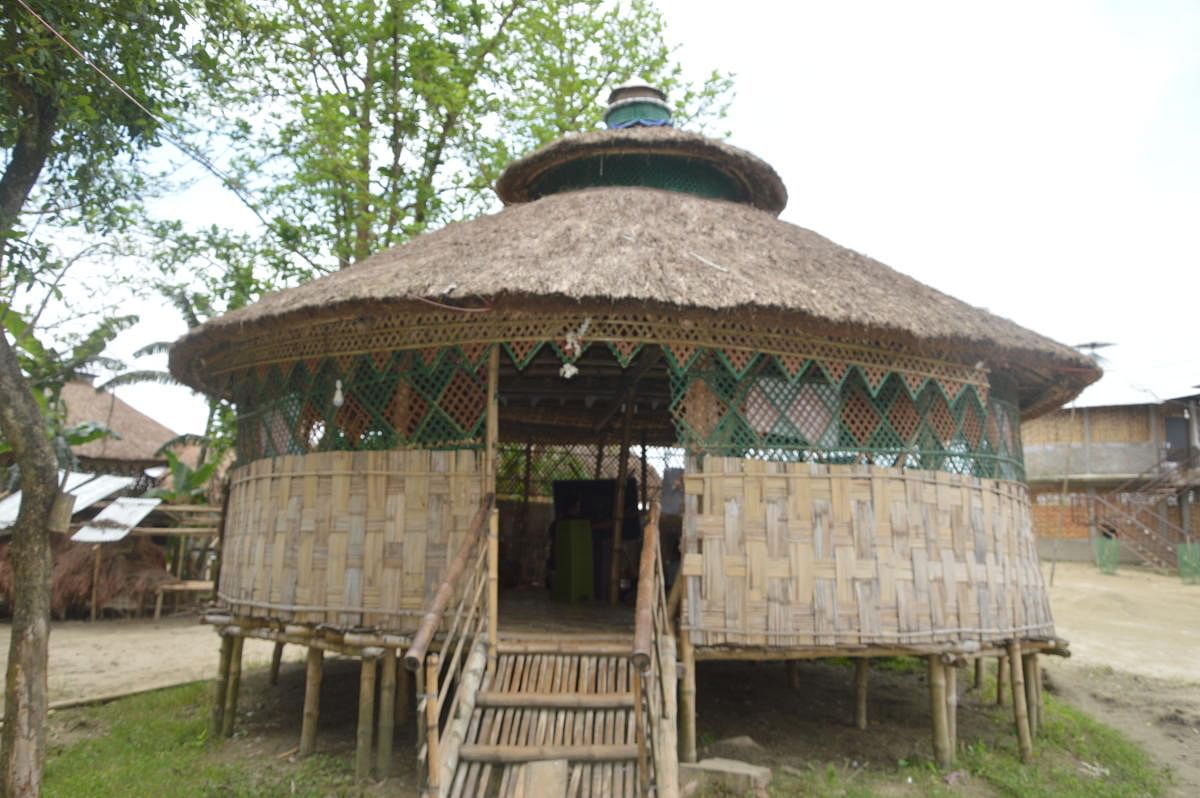For flood-affected kids in Majuli, this school is cool

The muddy or the flooded eight-km road between Kohardubi and Kolamua during monsoon would perhaps force many back from the scenic corner of Majuli, the world’s largest inhabited river island in eastern Assam.
There is water all around, most houses submerged, and the government schools shut for weeks till the water in the Brahmaputra surrounding the island recedes.
Such an inhospitable condition in these cluster of villages, inhabited mainly by Mishing tribe, however, provided Bipin Dhane, an IIT-Kharagpur post-graduate, all he was looking for since he quit his job as a design engineer at a Singapore-based company.
“It was my wish to open a school for children like them,” Bipin told DH, pointing to a group of children exiting a bamboo-hut classroom at Hummingbird, a school he started here in January 2017.
From 70 students, mostly belonging to Mishing tribe and Bengalis in Kolamua Sapori (a small island), Hummingbird at present has 210 students. As they live close to the Brahmaputra, these children bear the brunt of floods and erosion — two major fallouts of climate change.
Schools remain shut due to floods almost every year, and many of their houses are washed away by floods or eroded. Even when the government schools open, there is a shortage of teachers and lack of basic infrastructure. “Their parents wanted to send them to English-medium boarding schools to avoid flood, but they can’t afford it. So, when I shared my idea of opening a model school here with a boarding facility, the villagers supported me with all they had — they provided eight bighas of land, donated bamboo, and constructed the houses with their own hands. The love shown by the villagers made me stay here and fulfil my long-cherished dream,” said Bipin, originally hailing from Satara in Maharastra. Bipin completed his M Tech in ocean engineering and naval architecture in 2013.
Then there were more...
Initially, Bipin was the only teacher, but a social media campaign attracted at least three young professionals from Kerala, Bihar and a batchmate from Rajasthan. “Funding was a problem initially and even I had to take a loan at 10% interest. Later, two Bangaluru-based firms and another from Mumbai supported us,” he said.
If Assam is the state most vulnerable to climate change as identified by a recent study supported by the department of science and technology, Government of India, Majuli is the epicentre. As the severity and frequency of floods increased mainly due to the melting of the snow in the upper reaches of the Himalayas and erratic rainfall pattern, Majuli faces serious floods and continuous bank erosion of the Brahmaputra.
A report of Assam State Disaster Management Authority says over 16,600 bighas of the island’s land eroded between 2001 and 2018. According to Neera Shrestha Pradhan, senior water and adaptation specialist of Kathmandu-based International Centre for Mountain Development (ICIMOD), as the Hindu Kush Himalayan region has been witnessing the impact of climate change in the form of flood and erosion, its fury hits women and children, including those in ecologically sensitive Majuli island. “One-third of the natural disasters in the Himalayan region floods and 60% of them cause displacement,” she said.
“Normally we witness floods in July when schools remain shut for the summer holidays. But we get floods in August, September and October, too, and schools remain closed then,” said Minati Das, mother of Moina, a class VI student.
At least 70 of the 210 students in Hummingbird now live in the hostels.
Model of education
Hummingbird follows the ‘self-learning’ model of teaching. “Unlike government schools, we ask our students to read a new chapter and discuss it among themselves first. The teachers step in where they don’t understand. This helps the students to learn better and remember what they are studying,” said Bipin.
All students, including those who transferred from government-run schools, now speak English. “Besides, we teach them to read and write their mother tongue, Mishing or Bengali, apart from Assamese,” he said.
In order to make the education inclusive, Dhane set up Ayang Trust in November 2017 and started vocational courses like weaving and carpentry not only for the children but for the women there. “Some children have learnt baking and making their birthday cake themselves,” he said. Acting, singing, music, football, taekwondo are given importance at The Hummingbird.
About 100 students are provided free education, those who can afford fees pay Rs 250 per month. “Many want to start more schools in the rest of Majuli based on this. But I said no as I’m for business,” he said.
Hummingbird is also training up local youths and preparing them to take up teaching as a profession. “We have trained about 15 graduate boys and girls, and they are now part of our teaching staff,” Bipin said.
So, how long Bipin will live in Majuli? “I want to spend my life here with the children. They are part of my life now,” he said.
“We will never allow him to go. He came here for us from far away. He loves us so much and never scolds us. If he leaves, where will we get such a good school?” asked Madhurjya Pegu, a class IV student, as he sat on Bipin’s shoulder, as others around him laughed at their bonding.
Floods have affected over 20,000 residents in Majuli this time.
(This story is published as part of IHCAP-CMS Media Fellowship programme)